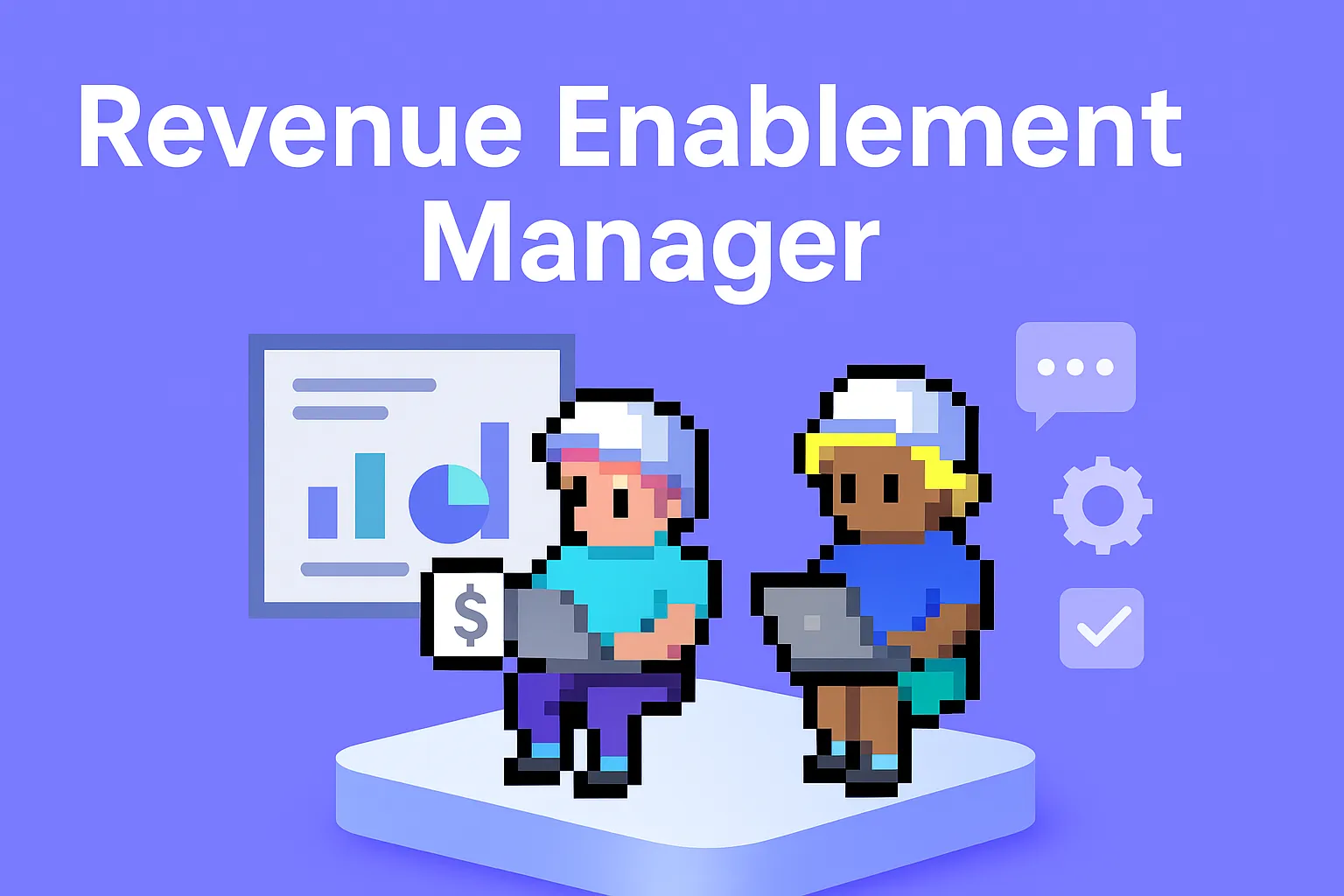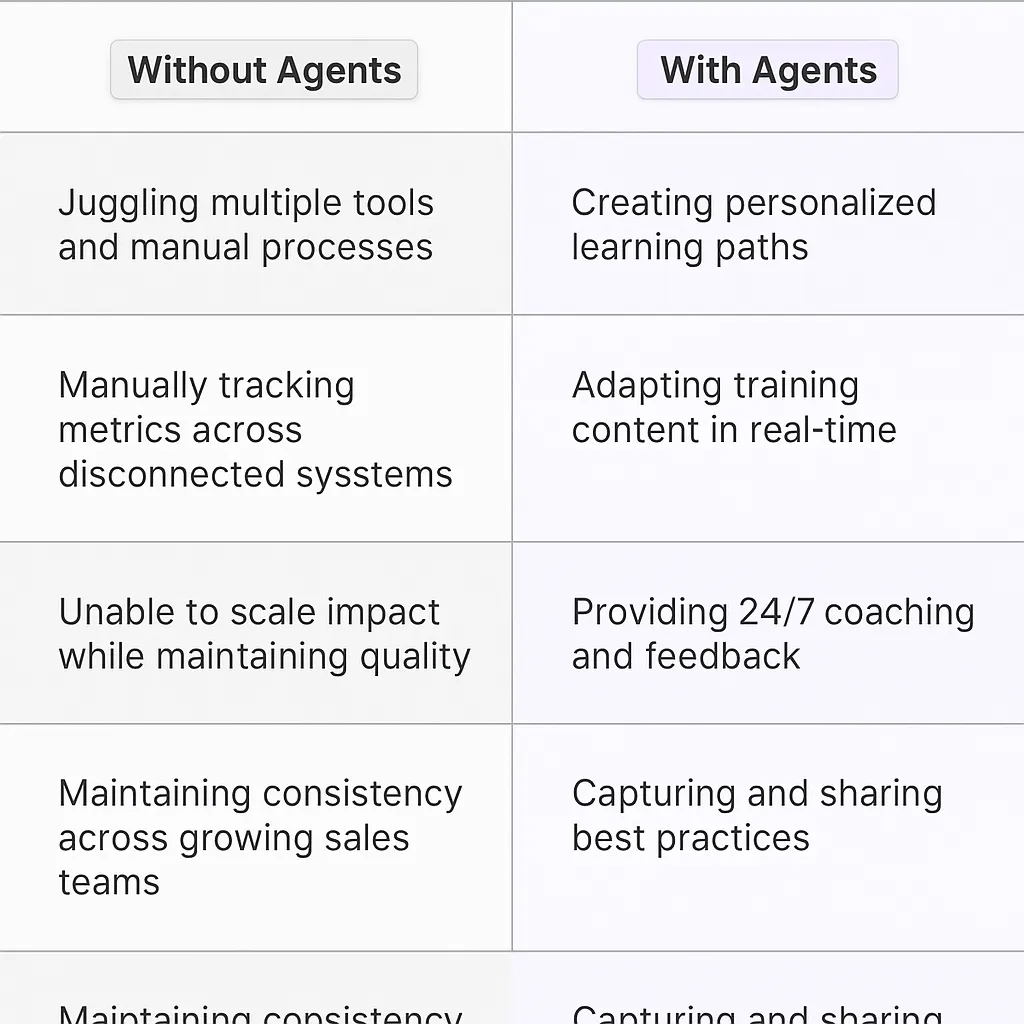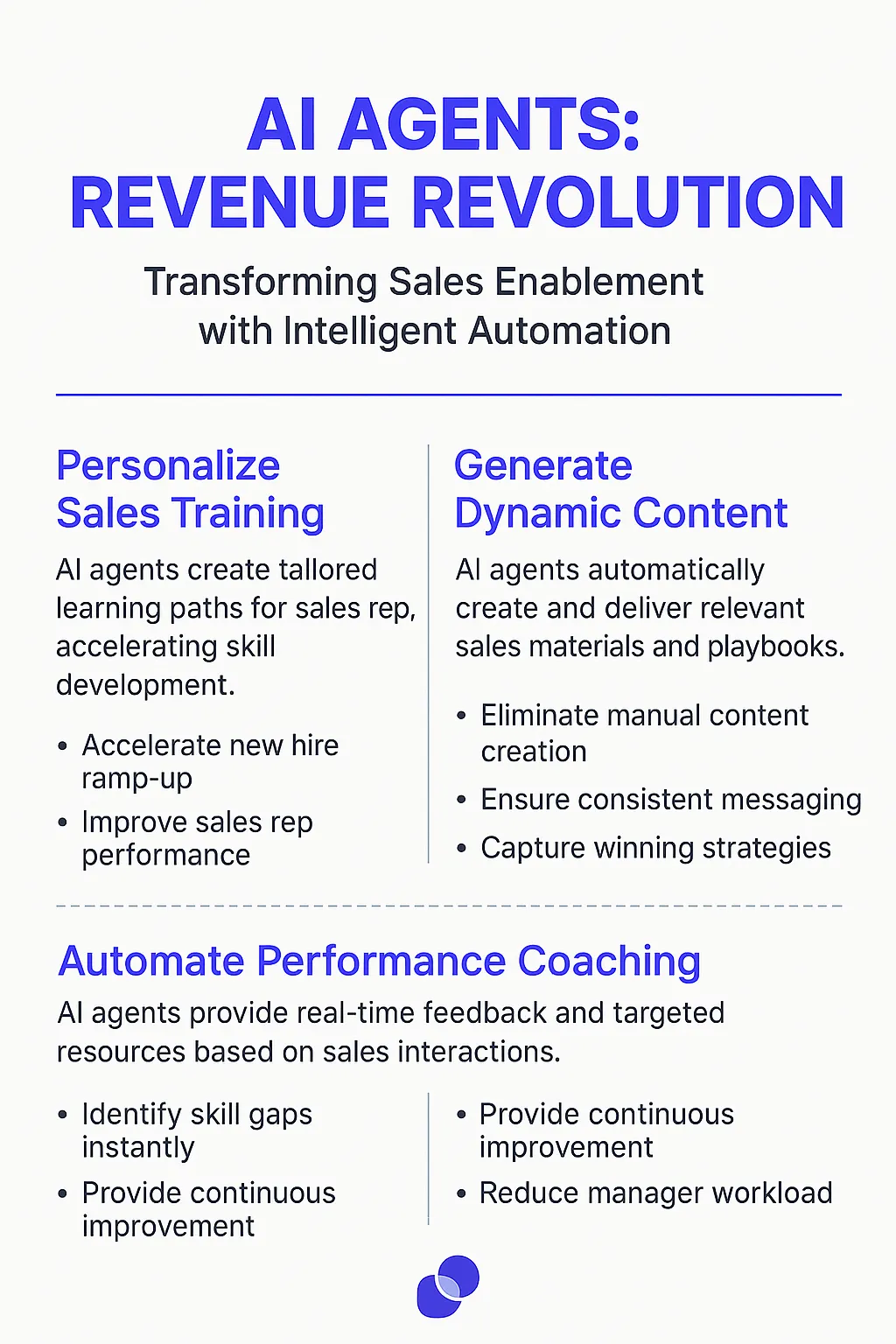Revenue Enablement Manager AI Agents are sophisticated digital teammates that work alongside human enablement professionals to optimize sales performance and drive revenue growth. They combine machine learning capabilities with deep sales expertise to automate content creation, deliver personalized training, and provide real-time coaching to sales teams. Unlike traditional enablement tools, these AI Agents learn and adapt from every interaction, creating a continuous improvement cycle that scales across the entire revenue organization.

Revenue enablement managers traditionally juggled multiple tools and manual processes - from spreadsheets tracking sales training completion rates to PowerPoint decks for onboarding. They spent countless hours creating content creation, scheduling training sessions, and manually tracking metrics across disconnected systems. The real pain point? They couldn't scale their impact across growing sales teams while maintaining quality and consistency.
Digital teammates fundamentally transform how revenue enablement managers operate. The network effects are fascinating - as more sales reps interact with AI Agents, the knowledge base becomes increasingly valuable and nuanced.
These AI Agents excel at:
The most compelling aspect is how AI Agents enable revenue enablement managers to shift from reactive content creation to proactive strategy. When routine tasks are handled by digital teammates, managers can focus on high-impact activities like developing innovative training programs and analyzing trends to predict future enablement needs.
The data shows that teams using AI Agents see up to 60% reduction in time-to-productivity for new hires and a 40% increase in content engagement rates. But the real magic happens in the compound effects - as AI Agents learn from each interaction, they create an ever-expanding knowledge flywheel that drives continuous improvement across the entire revenue organization.

Revenue enablement is entering a fascinating new phase where AI agents act as force multipliers for sales teams. The key insight here is that these digital teammates aren't just handling administrative tasks - they're actively participating in the revenue generation process.
When we look at top-performing sales organizations, we see a clear pattern: the ones winning are those that can rapidly iterate on their enablement strategies. AI agents accelerate this iteration cycle by processing vast amounts of deal data, conversation intelligence, and market signals in real-time.
The most compelling use case I'm seeing is the ability to create dynamic, self-improving playbooks. Traditional sales playbooks become outdated the moment they're published. AI-powered playbooks evolve continuously, learning from every customer interaction and deal outcome. This creates a powerful feedback loop where each successful deal makes the entire sales organization more effective.
For revenue enablement managers, this shift means moving from a reactive, training-focused role to becoming strategic architects of AI-enhanced sales processes. The organizations that understand and embrace this transition will build sustainable advantages in their markets.

Revenue enablement managers face intense pressure to drive growth while juggling multiple stakeholders, tools, and processes. AI agents are becoming critical partners in this complex dance of sales optimization and team empowerment. The versatility of AI agents in revenue enablement makes them valuable across various industries, fundamentally changing how teams operate and succeed.
What's fascinating is how these digital teammates adapt to different business contexts - from SaaS companies scaling their sales operations to manufacturing firms modernizing their revenue approaches. They're not just handling routine tasks; they're actively participating in strategic revenue initiatives, learning from each interaction, and evolving alongside human teams.
The real power emerges when revenue enablement managers deploy AI agents as force multipliers, creating scalable processes that work 24/7 to support sales teams, analyze performance metrics, and maintain consistency in revenue operations. This shift represents a fundamental evolution in how organizations approach revenue enablement - moving from reactive support to proactive, data-driven strategy execution.
The SaaS industry faces a unique challenge: rapidly growing sales teams need to master an ever-expanding product surface area while maintaining high-quality customer conversations. I've seen countless revenue teams struggle with this exact problem - the more features you ship, the harder it becomes to keep everyone aligned on positioning and value props.
Revenue Enablement Manager AI agents transform this dynamic by creating a continuous learning environment. When a product team ships new features, the AI agent automatically analyzes release notes, documentation, and customer feedback to generate targeted training materials. But what makes this truly powerful is the personalization layer.
For example, when a sales rep at a marketing automation company is preparing for a call with an enterprise prospect, the AI agent can analyze the prospect's tech stack, previous conversations, and deal history to surface the most relevant product capabilities and competitive differentiators. The agent doesn't just provide static information - it generates custom objection handling scenarios and role-playing exercises based on the specific prospect's industry and use case.
The network effects here are fascinating. As more reps interact with the AI agent, it builds a rich knowledge base of what messaging resonates with different buyer personas. When a rep in EMEA has a successful call using a specific value proposition, that insight gets automatically shared with teams in other regions. The traditional enablement bottleneck of manual content creation and distribution disappears.
The metrics tell the story: SaaS companies using AI-driven revenue enablement typically see new rep ramp time decrease by 40-50% while win rates increase 15-20%. But the real magic is in the compound effect - as the AI agent learns from each interaction, the entire revenue organization gets smarter together.
I've spent time with several manufacturing companies lately, and there's a fascinating pattern emerging in how they're using Revenue Enablement Manager AI agents to tackle one of their biggest challenges: selling increasingly complex industrial equipment with long sales cycles and multiple stakeholders.
One heavy machinery manufacturer I worked with was struggling with a common problem - their sales team needed to master technical specifications across hundreds of SKUs while navigating intricate procurement processes. Their seasoned reps could handle this complexity, but training new reps took 12-18 months. This created a massive growth bottleneck.
The Revenue Enablement Manager AI agent transformed their approach by creating dynamic, contextual learning paths. When a rep starts working on a deal for custom manufacturing equipment, the AI analyzes the prospect's industry, existing machinery setup, and compliance requirements. It then builds personalized micro-learning modules focusing on relevant technical specifications, industry-specific use cases, and ROI calculations.
What's particularly clever is how the AI agent taps into tribal knowledge. It studies successful deals, identifying patterns in how top performers position specific features to different stakeholders - from plant managers to CFOs. For example, when discussing automated quality control systems with operations leaders, successful reps focus on downtime reduction metrics, while procurement conversations center on total cost of ownership.
The results are striking: new rep ramp time dropped from 18 months to 7 months. But the most interesting metric is deal size - reps supported by the AI agent close 30% larger deals because they're better equipped to sell the full value stack of complex equipment configurations. The AI helps them spot upsell opportunities they might have missed and provides real-time coaching on how to position premium features.
This creates a powerful flywheel effect - each successful deal enriches the AI's understanding of effective sales strategies, making the entire team more sophisticated in how they sell complex manufacturing solutions.
Implementing a Revenue Enablement Manager AI agent requires careful navigation of several technical hurdles. The integration with existing CRM systems like Salesforce demands clean, structured data - which most sales organizations lack. Many companies store crucial revenue data across disconnected systems, from email threads to spreadsheets, making it difficult for the AI to access and analyze comprehensive information.
The AI agent needs to process multiple data types simultaneously - numerical sales data, qualitative customer feedback, and unstructured communication logs. Building reliable natural language processing capabilities that can accurately interpret sales conversations while maintaining context remains a significant technical barrier.
Sales teams often resist new technology that appears to monitor or measure their activities. The introduction of an AI Revenue Enablement Manager requires thoughtful change management and clear communication about how it augments rather than replaces human capabilities. Sales leaders need to actively demonstrate the AI's value in reducing administrative burden and improving win rates.
Training the AI on company-specific sales processes and terminology demands significant upfront investment. Each organization has unique sales methodologies, pricing structures, and customer segments that the AI must learn to navigate effectively. Without proper configuration, the AI may make recommendations that conflict with established sales practices or miss crucial context in deal evaluations.
Revenue data contains sensitive information about pricing, margins, and customer relationships. Organizations must implement robust security measures to protect this data while still allowing the AI agent to access and analyze it effectively. Compliance with industry regulations and data protection laws adds another layer of complexity, especially when dealing with international sales operations.
The AI agent needs clear parameters about what information it can share and with whom. Sales teams often operate in silos, and maintaining appropriate data access controls while fostering collaboration requires sophisticated permission systems and governance frameworks.
Quantifying the ROI of an AI Revenue Enablement Manager presents unique challenges. While certain metrics like reduced administrative time are straightforward to measure, others like improved decision quality or enhanced customer relationships require more nuanced evaluation frameworks. Organizations need to establish clear KPIs that account for both direct and indirect impacts on revenue performance.
The integration of AI Agents into revenue enablement marks a fundamental shift in how organizations develop and support their sales teams. The most successful companies will be those that embrace these digital teammates not just as productivity tools, but as strategic assets that can transform their entire revenue operation. The data speaks for itself - faster ramp times, higher win rates, and more consistent sales execution. But the real story is about scale and compound effects - every interaction makes the system smarter, creating an unstoppable flywheel of continuous improvement. For revenue enablement managers willing to embrace this change, the opportunity to build truly data-driven, AI-enhanced sales organizations has never been more exciting.